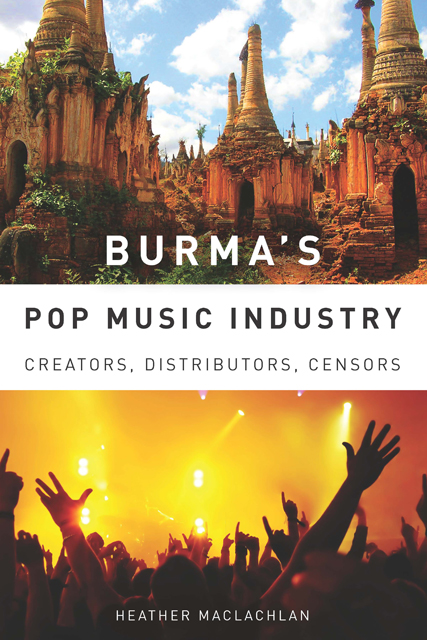Book contents
- Frontmatter
- Dedication
- Contents
- List of Illustrations
- Acknowledgments
- Introduction
- 1 The Creators of Burmese Pop Music
- 2 The Sound of Burmese Pop Songs
- 3 Learning Music in Burma Today
- 4 Six Facets of the Burmese Pop Music Industry
- 5 Musicians and the Censors: The Negotiation of Power
- Conclusion: The Significance of the Burmese Perspective
- Notes
- Bibliography
- Index
5 - Musicians and the Censors: The Negotiation of Power
Published online by Cambridge University Press: 11 February 2023
- Frontmatter
- Dedication
- Contents
- List of Illustrations
- Acknowledgments
- Introduction
- 1 The Creators of Burmese Pop Music
- 2 The Sound of Burmese Pop Songs
- 3 Learning Music in Burma Today
- 4 Six Facets of the Burmese Pop Music Industry
- 5 Musicians and the Censors: The Negotiation of Power
- Conclusion: The Significance of the Burmese Perspective
- Notes
- Bibliography
- Index
Summary
Observers of international affairs consistently identify Burma’s military government as a totalitarian regime, which manifests its cruelty toward its citizens in a myriad of ways, including the restriction of public expression. The titles of two of the best-known recently published books about Burma exemplify this characterization, Living Silence by Christina Fink and Karaoke Fascism by Monique Skidmore. The titles evoke the dangers of making sound, literal and figurative, in Burmese society. Reporters Without Borders, which releases an annual report that “reflects the degree of freedom that journalists and news organisations enjoy in each country, and the efforts made by the authorities to respect and ensure respect for this freedom,” ranked Burma number 164 out of 169 in 2007. Upon releasing their 2007 list, the group made a statement of special concern about Burma:
We are particularly disturbed by the situation in Burma (164th). The military junta’s crackdown on demonstrations bodes ill for the future of basic freedoms in this country. Journalists continue to work under the yoke of harsh censorship from which nothing escapes, not even small ads.
As the Reporters Without Borders website implies, journalists’ freedom to speak and write is reliant on the degree of censorship they must endure. Some scholars of Burma have already written helpful accounts of censorship in that country. The best of their writing, to date, has focused on the government’s treatment of written texts and their authors. The Fink and Skidmore monographs mentioned above treat this subject, and Anna J. Allott’s Inked Over, Ripped Out: Burmese Storytellers and the Censors focuses exclusively on it.
Aung Zaw’s book chapter “Burma Under Siege” is the only comprehensive scholarly treatment of the censorship of music in particular. (The chapter is a compilation of the research he performed and supervised during his tenure as editor of the Irrawaddy online magazine, which has an ongoing interest in music and censorship in Burma.) In total, the literature about censorship of artistic expression in Burma is remarkably brief, given the importance of this issue to artists and their audiences—millions of Burmese people.
- Type
- Chapter
- Information
- Burma's Pop Music IndustryCreators, Distributors, Censors, pp. 141 - 174Publisher: Boydell & BrewerPrint publication year: 2011

